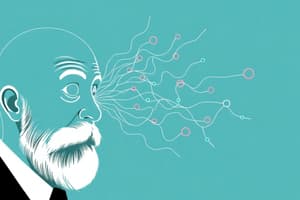Podcast
Questions and Answers
What is personality?
What is personality?
- A sum of experiences
- A fixed trait that does not change
- An individual's characteristic pattern of thinking, feeling, and acting (correct)
- A set of inherited traits
What does the psychodynamic perspective emphasize?
What does the psychodynamic perspective emphasize?
Freud's clinical experience and the theory of personality including psychosexual stages and the unconscious mind.
What are erogenous zones?
What are erogenous zones?
Pleasure-sensitive body areas.
What is the role of the Id in personality?
What is the role of the Id in personality?
What does the Superego provide?
What does the Superego provide?
What is the function of the Ego?
What is the function of the Ego?
What is the unconscious mind?
What is the unconscious mind?
How is dream analysis used in psychology?
How is dream analysis used in psychology?
Which of the following are considered defense mechanisms? (Select all that apply)
Which of the following are considered defense mechanisms? (Select all that apply)
What is repression?
What is repression?
What does regression involve?
What does regression involve?
What is denial?
What is denial?
What does sublimation involve?
What does sublimation involve?
What is reaction formation?
What is reaction formation?
What is projection?
What is projection?
What does rationalization provide?
What does rationalization provide?
What is displacement?
What is displacement?
What are projective tests?
What are projective tests?
What is the Rorschach Inkblot Test?
What is the Rorschach Inkblot Test?
What is the Thematic Apperception Test (TAT)?
What is the Thematic Apperception Test (TAT)?
Critics argue that projective tests have reliability and validity.
Critics argue that projective tests have reliability and validity.
What is an inferiority complex?
What is an inferiority complex?
What does being compliant mean?
What does being compliant mean?
What does being aggressive indicate?
What does being aggressive indicate?
What does being detached refer to?
What does being detached refer to?
What does the collective unconscious contain?
What does the collective unconscious contain?
What is extraversion?
What is extraversion?
What is introversion?
What is introversion?
What are the aspects of the modern unconscious mind?
What are the aspects of the modern unconscious mind?
What does the humanistic perspective emphasize?
What does the humanistic perspective emphasize?
What is the trait perspective?
What is the trait perspective?
Flashcards are hidden until you start studying
Study Notes
Personality
- Defined as an individual's characteristic pattern of thinking, feeling, and acting.
Psychodynamic Perspective
- Developed by Freud, incorporating psychosexual stages, the unconscious mind, and defense mechanisms.
Erogenous Zones
- Areas of the body that are sensitive to pleasure-seeking energies.
Id
- Represents basic sexual and aggressive drives; operates on the pleasure principle, seeking immediate gratification.
Superego
- Functions as the conscience, providing standards for judgment and operating on the morality principle.
Ego
- Serves as the executive mediator between the demands of the id and the superego.
The Unconscious Mind
- A reservoir of largely unacceptable thoughts, wishes, feelings, and memories; accessed via free association.
Dream Analysis
- Method of analyzing the unconscious by interpreting both manifest and latent contents of dreams.
Defense Mechanisms
- Include repression, regression, denial, sublimation, reaction formation, projection, rationalization, and displacement.
Repression
- Mechanism that banishes anxiety-provoking thoughts, feelings, and memories from consciousness.
Regression
- Occurs when an individual facing anxiety reverts to a more infantile psychosexual stage.
Denial
- Involves refusing to acknowledge anxiety-provoking realities.
Sublimation
- Process of channeling socially unacceptable impulses into socially acceptable behavior.
Reaction Formation
- Causes the ego to switch unacceptable impulses into their opposites unconsciously.
Projection
- Individuals disguise threatening impulses by attributing them to others.
Rationalization
- Offers self-justifying explanations for actions, masking real unconscious reasons.
Displacement
- Shift of emotional responses from the original object to a more acceptable target.
Projective Tests
- Instruments designed to evaluate personality by revealing the hidden aspects of the unconscious mind.
Rorschach Inkblot Test
- Widely used projective test featuring 10 inkblots to analyze people's inner feelings through interpretations.
Thematic Apperception Test (TAT)
- Developed by Henry Murray; a projective test where individuals create stories about ambiguous scenes to express their feelings.
Projective Tests: Criticisms
- Critics highlight issues with reliability (consistency) and validity (predictive capability) of these tests.
Inferiority Complex
- A psychological struggle that children experience during growth, leading to a desire for superiority and power.
Compliant
- Personality type characterized by moving towards others, seeking love and appreciation.
Aggressive
- Personality type defined by striving against others for admiration and respect.
Detached
- Personality type involving movement away from others, aiming for independence and self-sufficiency.
Collective Unconscious
- Contains shared images and archetypes derived from human species’ past, explaining common cultural myths.
Extraversion
- Focus on the external world and interactions with others.
Introversion
- Orientation towards an inner subjective world; emphasis on introspection.
The Modern Unconscious Mind
- Comprises implicit memories, automatic emotional responses, and unconscious stereotypes influencing behavior.
Humanistic Perspective
- Highlights free will and individual choice, emphasizing human capacities (Rogers & Maslow).
The Trait Perspective
- Focuses on the unique combination of traits that define individual personality.
Studying That Suits You
Use AI to generate personalized quizzes and flashcards to suit your learning preferences.




